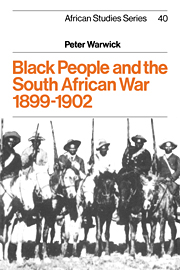Book contents
Summary
Between June 1901 and May 1902, 27,927 Boer refugees perished in British concentration camps in South Africa, a death toll of extraordinary proportions that probably amounted to twice the number of men killed in action during the war on both sides, and represented perhaps 10 per cent of the Boer populations of the two republics. In October 1901 the annual death rate in the camps reached 344 per thousand. More than 22,000 of those who died were children under the age of sixteen, and more than 4000 victims were adult women. The hardships endured by Boer women and children in the camps aroused a storm of criticism in South Africa, Britain and indeed throughout the world, and became an issue around which opposition to the war in Britain crystallised. The Liberal leader, Sir Henry Campbell-Bannerman, described the army's policy of clearing vast areas of countryside in the Boer republics of livestock and crops, burning farmsteads, and removing the civilian population into concentration camps, as tantamount to ‘methods of barbarism’. Lloyd George likened the army's methods to those of Herod, who had also ‘attempted to crush a little race by killing its young sons and daughters’. The suffering and humiliation of women and children in the concentration camps have become implanted indelibly on the collective memory of the Afrikaner people.
Yet it was not only Boer civilians who were compelled to endure the hardships of life (and death) in British concentration camps.
- Type
- Chapter
- Information
- Black People and the South African War 1899–1902 , pp. 145 - 162Publisher: Cambridge University PressPrint publication year: 1983
- 2
- Cited by



